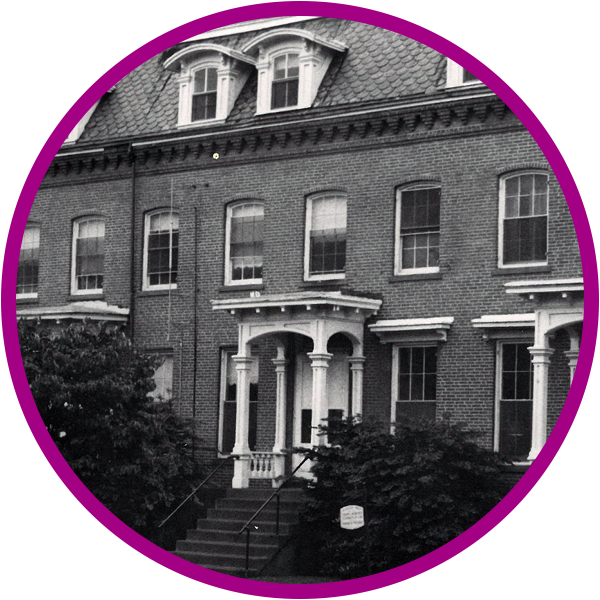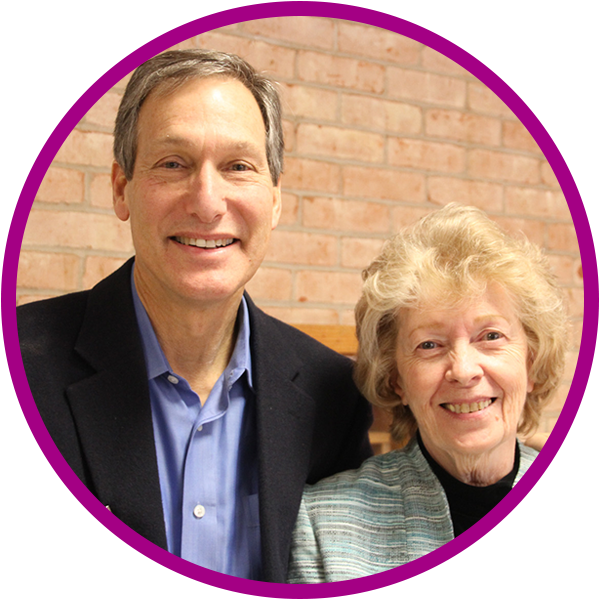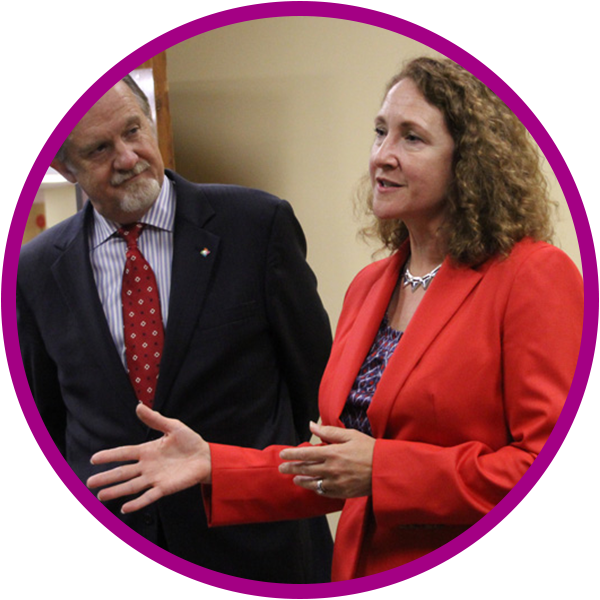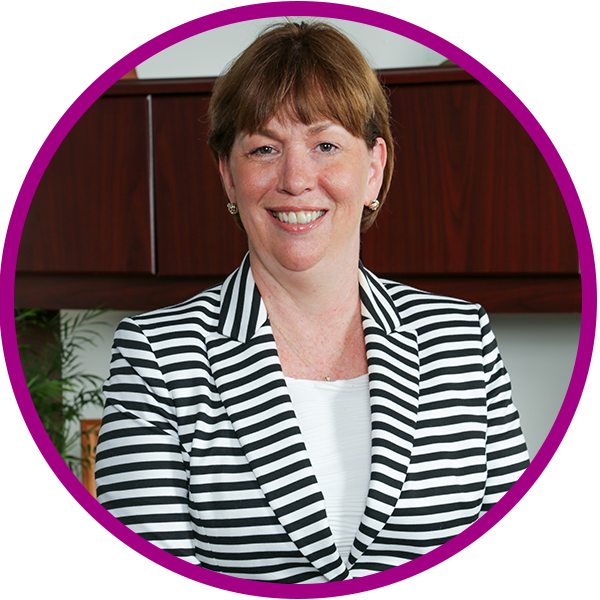Connecting to Community >

Tri County's Crescent Street, Middletown Headquarters in 1982.
Rushford’s history includes listening to community needs — and responding to them
It takes good leadership — board members, executive directors and presidents, directors and staff — to successfully bring an organization to its 40th anniversary. In the case of Rushford Center, this has included a unique combination of leaders — Jeff Walter, Steve Larcen and, soon, Pat Rehmer — who have been and will continue to listen to the needs of the community and create partnerships to better serve the ever-evolving need for behavioral health services.
The Tri-County Alcohol Council — Rushford’s forerunner — started in 1975 as a group of concerned Middlesex County citizens with an intent to provide information on alcohol abuse and alcoholism and to act as a catalyst in developing services to prevent and treat alcoholism in Middlesex County. With just three employees and a very active board of directors, Tri-County found a home for its start-up non-profit on the second floor of the South Congregational Church Parish House at 21 Pleasant Street, Middletown.
Jeff Walter at the opening of Rushford at Middletown in 1990.
Despite enthusiasm and good intent, Tri-County floundered. By 1979, with money running out and services nearly non-existent, the Tri-County board of directors hired then 27-yearold Jeff Walter as executive director.
“What I found when I went there that first day is what makes my first day truly remarkable, especially when you compare it to where Rushford is now,” Walter said. “I was interested in trying my hand at running a non-profit organization, and had an interest in alcohol recovery,” he recalled. “I showed up on November 12, 1979, I introduced myself to the receptionist, Carolyn (Lyn) Shaw and chatted with her for a while. Then I asked Lyn if she could introduce me to the rest of the staff. She said ‘I am the rest of the staff, and I leave at noon.’”
“I was interested in trying my hand at running a non-profit organization, and had an interest in alcohol recovery,” he recalled. “I showed up on November 12, 1979, I introduced myself to the receptionist, Carolyn (Lyn) Shaw and chatted with her for a while. Then I asked Lyn if she could introduce me to the rest of the staff. She said ‘I am the rest of the staff, and I leave at noon.’”

Jeff Walter and his longtime executive secretary, Sandy Rasch, on Jeff’s retirement day in 2014.
Grassroots efforts
While others would be tempted to leave that day and never come back, Walter was undeterred. He ultimately led Tri-County (now Rushford) as its president and CEO for more than 30 years.
“I started introducing myself to key people around town: United Way, town officials, chamber of commerce, state politicians,” said Walter. With guidance and support from the board, he determined that partnering with local school systems to provide prevention services would provide a quick organizational revival.
Walter worked closely with Shaw and a group of volunteers to begin a Family Counseling Program as well as the Student Assistant Program, training teachers in area schools on the signs of alcohol abuse and embedding counselors in high schools to confidentially help struggling teens.
Simultaneously, he worked with the board on Gus Rushford’s long-time dream of a residential alcoholism treatment center for Middletown and the surrounding area.
“Lyn and I fielded calls from people and their families seeking alcohol recovery treatment, but really the only treatment option was the state hospital (Connecticut Valley Hospital, or CVH), which was very difficult to get into. There weren’t really any other resources back then,” Walter said. “Gus would walk up and down Main Street (Middletown) trying to raise money for his dream. I encouraged him, but knew he would need some help from us.”
Humble beginnings
In 1982, Tri-County opened a 22-bed residential alcoholism treatment center, with financial assistance from a special grant provided by the Connecticut General Assembly. The center was named the Gus Rushford Treatment Center, honoring the modest but determined local man who dedicated more than three decades of his life to helping others in Middletown achieve sobriety.
Based upon the belief that recovery is most effectively accomplished in a community based setting, the Gus Rushford Treatment Center, as part of the Tri-County Alcohol Council, offered short-term detoxification and three-week intensive treatment programming which included counseling and AA meetings. A three-to-six month halfway house program also offered recovering alcoholics the opportunity to work during the day and return to an alcohol-free environment in the evening. The fledgling operation was judged a success based upon an independent study commissioned by the Connecticut State Legislature in 1984.
By 1987, the Tri-County Alcohol Council broadened its mission to recognize alcohol and other drug use prevention and treatment. Walter’s vision was to sustain and grow the organization while unifying it under a single name
and a single roof.
“Tri-County Alcohol Council was a confusing name. What did it mean? No one really knew,” Walter said. “The outpatient base was growing and we knew that was the future. I wanted a continuum of care and a true ‘center’ and I wanted it to provide quality services that would make the community proud.” Rechristening Rushford Center in 1987 proved the easier task. Finding a single place to headquarter the organization took until 1990, when Rushford purchased the Town Farms Inn on Silver Street in Middletown (See Connecting to Community << through services and growth >>).
“I was very proud of the way Rushford was embraced by the community,” Walter recalled.
With the dawn of the 1990s, Rushford’s employees numbered between 50 and 60, and afforded the organization the opportunity to again expand programming, this time to include an outpatient treatment program for recovering substance users — both adults and teens — that allowed them to receive treatment and remain at home and employed.
Strategic growth
The 1990s again marked a period of rapid growth for Rushford. In 1993, Rushford assumed operation of Middlesex Hospital’s Substance Abuse Outpatient Clinic, began a daytime partial hospitalization program and increased its halfway house bed capacity from 12 to 22. In 1997, it opened a satellite office in Glastonbury, offering the full range of outpatient recovery services for adolescents and adults, and established ambulatory detoxification services at its Middletown facility.
In 1998, Rushford took the step of affiliating with Hartford HealthCare (HHC), becoming a member of its nascent Behavioral Health Network (BHN). Stephen W. Larcen, PhD, was appointed the first vice president of the HHC BHN earlier that year.
HHC affiliation and Behavioral Health Network
“The vision at that time was that Rushford would bring a strong addictions expertise to the Hartford HealthCare community,” Larcen said. “The other factor is that we were beginning to organize a managed care organization. Jeff (Walter) had been involved in that arena, and we knew he’d be helpful in organizing a managed care organization for the HHC Behavioral Health Network.”
That managed care unit is now part of Advanced Behavioral Health and provides employee assistance programs (Solutions EAP) to Hartford HealthCare and to many other organizations across the state.
The late 1990s was the beginning of the modern healthcare system movement, and Jeff Walter didn’t want Rushford left behind, believing, then and now, that the integration of behavioral health and primary care was integral to any person’s recovery process.
“I always felt that alcoholism and drug dependency services were part of healthcare,” Walter said. “For a variety of reasons, it was off to the side of the healthcare industry. But I felt it was critical for Rushford to be part of the community at large, the business community and the healthcare community. So I always worked toward that. For that reason, I always felt that the integration with HHC was one of a handful of keys to Rushford’s success,” Walter said.
Impact of HHC Affiliation
Expansion continued into the new millennium. In 2000 as part of HHC, Rushford assumed the operation and management of two children’s programs formerly operated by the Curtis Home of Meriden, including a residential treatment program for abused and traumatized boys and the Safe Harbors Program, for children removed from their homes by the Connecticut Department of Children and Families due to suspected neglect or abuse.
The following year, Rushford entered into a management contract to administer MidState Behavioral Health System, a subsidiary of Mid-State Medical Center, and by 2003, these outpatient mental health and substance use services for the Meriden and Wallingford communities had found a new home at Rushford. With this merger, Rushford became the Local Mental Health Authority (LMHA) for Meriden and Wallingford, under contract with the State Department of Mental Health and Addiction Services.
“In 2004, as part of an HHC initiative, we bought Stone Haven (Rushford at Portland), which had been owned by Elmcrest/St. Francis Behavioral Health, to provide intermediate beds as a step-down for clients from Silver Street,” Walter recalled.

Steve Larcen and Congresswoman Elizabeth Esty at the first-ever National Dialogue on Mental Health, held July 1, 2013 at Rushford in Meriden.
Healthcare changes, new leadership
Growth continued even as the face of healthcare changed. Rushford’s first medial director, J. Craig Allen, MD, joined the team in 2005. In 2010, Rushford opened an intensive residential treatment center for teenage boys in Durham. By 2010, accountability was on its way to becoming a key indicator of healthcare success, and the coordination of behavioral health with primary care again pushed to the fore.
In 2013, upon Walter’s retirement, Larcen took the reins at Rushford as its president. At the same time, he became the president for the HHC BHN, which includes Natchaug Hospital, Hartford Hospital’s Institute of Living and the behavioral health departments at Backus Hospital, MidState Medical Center and The Hospital of Central Connecticut.
Under his leadership the BHN has moved to embrace the HHC operating model, and created operational and quality initiatives systemwide. He’s credited with working to move forward with a primary care/behavioral health initiative to better coordinate community care, with behavioral health services embedded in family health centers. At 400 employees, Rushford is a relatively small but vitally important part of the BHN, and all of HHC.
“Rushford has a strong track record not only in the addictions area but also Rushford brings prevention and community education to the mix, which is an example for all within the BHN,” Larcen said. “They were early adopters of Mental Health First Aid (MHFA) that was invaluable as we responded to the tragedy at Sandy Hook. They were the first in the BHN to hold a National Dialogue on Mental Health forum.”
A system approach
Being part of the BHN has proven to be a plus for Rushford as an organization, too.
“The real impact for Rushford from a clinical perspective is that you can leverage best practices and pick up on the strengths of each of the entities,” he said.
Larcen is quick to emphasize the role of the Rushford Foundation in continuing to develop community outreach, not only from a philanthropic perspective but through community needs assessments for the entire continuum of care — not simply behavioral health.
“The Rushford Foundation, and its board, led by David Director, along with its volunteers, is the group that will continue to carry on assessing the community needs, and gaining community support for the Rushford mission moving forward.”

Patricia A. Rehmer, MSN, Hartford HealthCare’s Senior Vice President for Behavioral Health.
One era ends, another begins
With Steve Larcen’s retirement expected at the end of 2015, leadership change is again on the horizon for Rushford.
In early 2016, former Connecticut Department of Mental Health and Addiction Services (DMHAS) Commissioner Patricia Rehmer, MSN, is expected to take on the role of BHN president, adding to her current duties as HHC Senior Vice President for Behavioral Health.
“I think having a leader like Pat Rehmer addresses the community piece that has been part of Rushford for so long,” Larcen said. “Her roots are mental health and addiction services in the Connecticut community. Having someone who has both expertise and a passion for advocacy as a leader is an important ingredient to a bright future.”
Rehmer agrees, noting that she fully expects to make her mark in that area by partnering with other organizations whose specialty is aftercare.
“I see Rushford continuing as the primary provider of substance abuse recovery services for the BHN and all of HHC, as well as a hub of expertise on the topics of prevention, recovery and training through its fellowship program with the American Board of Addiction Medicine,” she said. “I also see Rushford turning to partnerships with other community organizations, such as Advocacy Unlimited, to help our clients get follow-up care and wraparound services.”
A bright future
Rehmer sees particular opportunity for Rushford to grow available services for adolescents and young adults ages 18-26.
“I’ve had long conversations with Craig (Allen, Rushford medical director) about how we can grow care for adolescents as we see the increase in substance abuse — particularly opiates — across the state. We’ll be looking at ways to get into that population and intervene earlier, which we know results in better recovery outcomes in the long term.”
Rehmer also sees an opportunity for Rushford at Meriden as the Local Mental Health Authority (LMHA) expands young adult services to those emerging from the care of the Department of Children and Families (DCF), yet still in need of behavioral health services.
“Rushford will be looking to better serve the young adults of the LMHA with the state-defined Young Adults Services (YAS) program that provides older teens and those in their early 20s with housing, treatment and wraparound services,” she said.
In short, Rushford’s ability to change and grow in order to respond to the needs of the community remains a vision for its future. With nearly 400 dedicated employees, Rehmer believes the future for Rushford belongs to each of them as leaders in one way, shape or form.
“Rushford has proven to be a leader in listening to the needs of the community and responding to those needs with quality, caring and continuous services. It’s been a winning formula for 40 years. Why change that now?”
